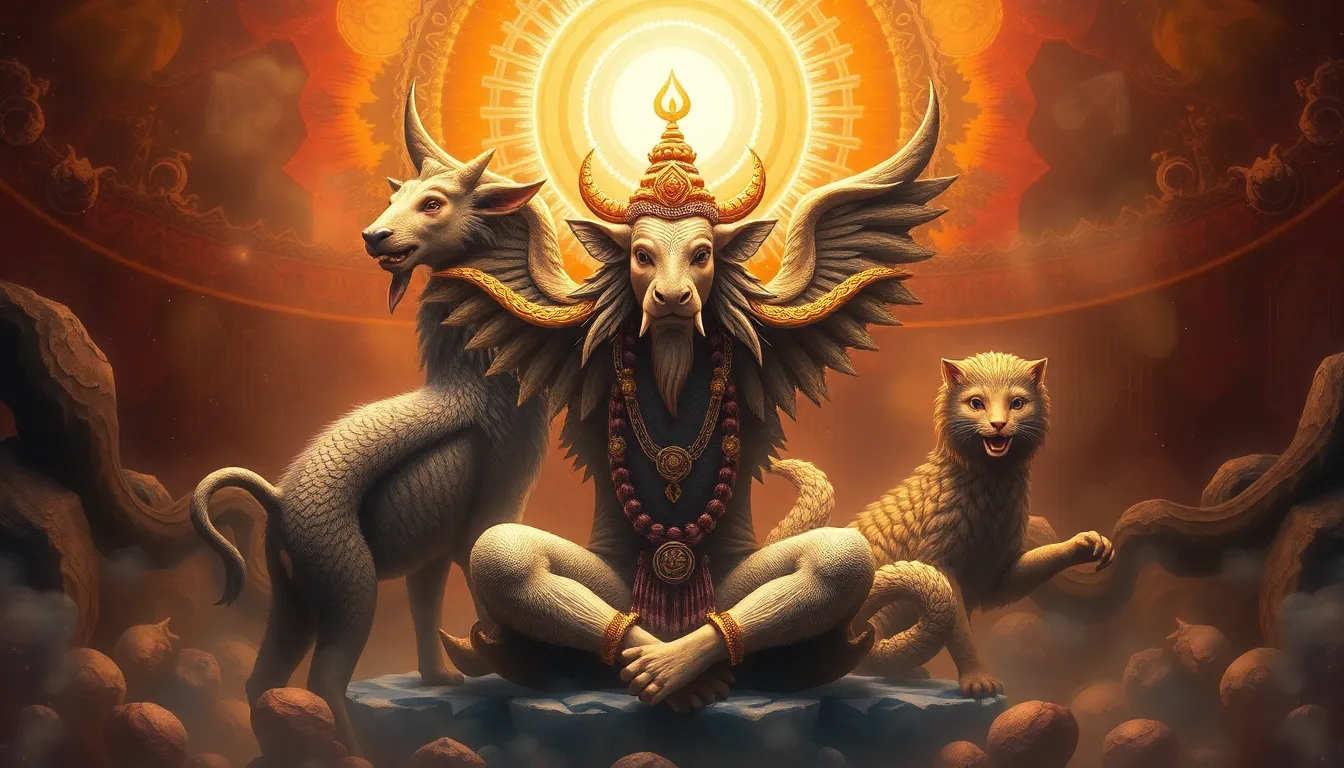Divine Punishments: The Myths That Will Shock Your Soul
I. Introduction
Divine punishment is often perceived as a form of retribution enacted by a higher power for wrongdoing or moral failings. It serves as a mechanism for enforcing moral order within societies, reflecting the belief that justice prevails in the universe. The cultural significance of divine retribution can be seen across various civilizations, where myths and religious teachings provide frameworks for understanding suffering and justice.
This article explores the myths surrounding divine punishments, shedding light on their historical context, common misconceptions, and implications in contemporary society. By delving into these narratives, we can better understand the human experience of justice, guilt, and morality.
II. Historical Context of Divine Punishments
A. Ancient civilizations and their beliefs
Ancient civilizations often attributed natural and social phenomena to the actions of gods, and divine punishment was a common explanation for misfortune or calamity.
1. Mesopotamian views
In Mesopotamia, the gods were seen as powerful forces that could dispense punishment for human transgressions. Myths such as the Epic of Gilgamesh illustrate the belief that divine beings could bring about floods, plagues, or other disasters as forms of retribution.
2. Egyptian mythology
Similarly, in Egyptian mythology, divine retribution was evident in the tales of gods like Osiris and Ra, who judged the souls of the deceased. The weighing of the heart against the feather of Ma’at symbolized the consequences of one’s actions in life, determining their fate in the afterlife.
B. The evolution of divine punishment in religious texts
1. Biblical accounts
The Bible is replete with accounts of divine punishment, from the plagues of Egypt to the destruction of Sodom and Gomorrah. These narratives serve as moral lessons about obedience and the consequences of sin.
2. Myths from Hinduism and Buddhism
In Hinduism and Buddhism, concepts of divine punishment are intertwined with karma. Actions in this life determine the fate of the soul in future incarnations, illustrating a cycle of moral cause and effect.
III. Common Myths About Divine Punishments
A. The idea of “an eye for an eye”
The principle of “an eye for an eye” is often misinterpreted as a justification for retaliation. However, in many religious contexts, it serves to limit retribution and promote justice rather than vengeance.
B. Misinterpretations of karma
Many people misunderstand karma as a simple cause-and-effect relationship, leading to the belief that all suffering is punishment. In reality, karma encompasses a broader understanding of actions and their consequences over multiple lifetimes.
C. The belief that suffering is always a punishment
The idea that suffering is a direct punishment for sin overlooks the complexities of human experience. Many cultures recognize that suffering can lead to growth, transformation, and understanding, rather than solely serving as retribution.
IV. The Role of Divine Punishments in Different Religions
A. Christianity: Guilt, sin, and redemption
In Christianity, the concepts of sin and guilt are central to the understanding of divine punishment. The narrative of redemption through Christ highlights the possibility of forgiveness and the transformative power of grace.
B. Islam: The concept of divine justice
Islam emphasizes divine justice, where God’s mercy and punishment coexist. The Quran outlines moral principles, encouraging believers to seek forgiveness while acknowledging the consequences of their actions.
C. Eastern religions: Cycles of karma and reincarnation
In Eastern religions like Hinduism and Buddhism, divine punishments are often viewed through the lens of karma and reincarnation. The belief in rebirth underscores the idea that actions in one life have repercussions in future existences.
V. Psychological Impact of Believing in Divine Punishments
A. Fear and guilt as motivational tools
Belief in divine punishment can instill fear and guilt, serving as motivational tools for ethical behavior. However, this can also lead to anxiety and distress, especially when individuals believe they are being punished for their shortcomings.
B. The effect on moral behavior and ethics
The belief in divine retribution can shape moral behavior, encouraging individuals to adhere to societal norms. However, it can also lead to moral confusion when individuals grapple with the complexities of justice and mercy.
C. Coping mechanisms in the face of perceived divine wrath
Many people develop coping mechanisms to deal with the fear of divine punishment, including prayer, rituals, and seeking forgiveness. These practices can provide comfort and a sense of control over one’s fate.
VI. Modern Interpretations of Divine Punishments
A. The shift towards secular understandings
In contemporary society, there is a noticeable shift towards secular understandings of morality and justice. Many individuals seek explanations for suffering that do not rely on divine retribution, focusing instead on psychological and social factors.
B. The impact of science on traditional beliefs
Advances in science and psychology challenge traditional beliefs about divine punishment, offering alternative explanations for suffering and misfortune. This shift encourages a more compassionate view of human experiences.
C. Contemporary examples in popular culture
Modern literature, film, and television often explore themes of divine punishment and justice, reflecting societal beliefs and anxieties. These narratives can serve as a means of processing moral dilemmas and ethical questions.
VII. Case Studies of Divine Punishments in Mythology
A. Prometheus and the gift of fire
In Greek mythology, Prometheus defied the gods by stealing fire and giving it to humanity. His punishment—being bound to a rock while an eagle fed on his liver—illustrates the theme of divine retribution for hubris and defiance.
B. The Flood in various mythologies
Many cultures recount stories of a great flood sent as divine punishment for humanity’s sins, such as the Biblical Noah’s Ark or the Mesopotamian Epic of Gilgamesh. These tales serve as cautionary narratives about moral decay and divine judgment.
C. The fate of Sodom and Gomorrah
The destruction of Sodom and Gomorrah is a prominent Biblical account of divine punishment. It symbolizes the consequences of rampant immorality and serves as a warning against societal corruption.
VIII. The Role of Divine Punishments in Social Justice
A. Using divine narratives to address inequality
Divine narratives can empower social justice movements by framing inequality as a moral issue. Activists often invoke these stories to highlight injustices and call for societal change.
B. The concept of divine justice in activism
Activists sometimes utilize the concept of divine justice to advocate for marginalized communities, arguing that moral accountability is essential for societal progress.
C. Ethical implications of divine retribution in modern society
The ethical implications of divine retribution raise questions about justice and mercy. As society grapples with issues of inequality and discrimination, understanding these concepts in a modern context is crucial.
IX. Debunking Divine Punishments: A Critical Perspective
A. Analyzing the origins of these myths
Many myths surrounding divine punishments have origins rooted in cultural and historical contexts. Analyzing these origins can help demystify their relevance in contemporary society.
B. The role of fear in perpetuating beliefs
Fear often perpetuates beliefs in divine punishment, leading individuals to cling to these narratives. Understanding the psychological factors at play can foster a more compassionate approach to suffering.
C. Encouraging a compassionate understanding of suffering
Promoting a compassionate understanding of suffering encourages individuals to seek empathy rather than judgment. This shift can lead to healthier societal attitudes and ethical frameworks.
X. Conclusion
Reflecting on the relevance of divine punishments today reveals the complexities of morality, justice, and human experience. Understanding these myths in a modern context is essential for fostering a compassionate worldview.
As we navigate the intricacies of justice and suffering
https://www.youtube.com/watch?v=Pj-X0PYCgDQ



